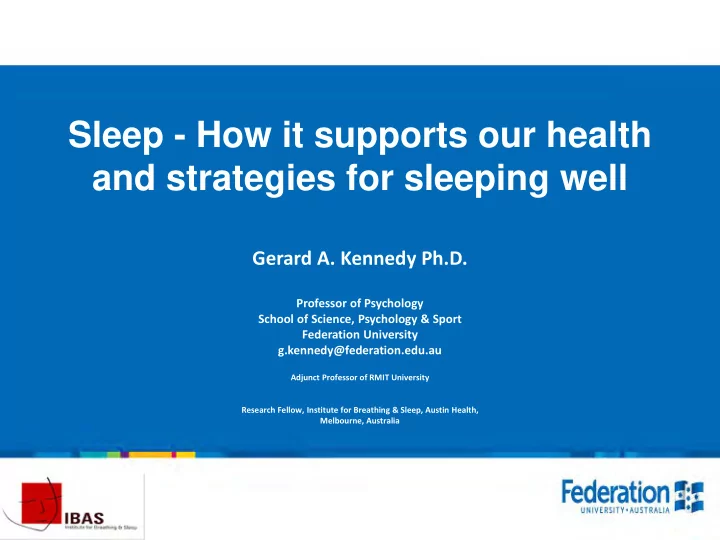

Faculty, school or centre title here Sleep - How it supports our health and strategies for sleeping well Gerard A. Kennedy Ph.D. Professor of Psychology School of Science, Psychology & Sport Federation University g.kennedy@federation.edu.au Adjunct Professor of RMIT University Research Fellow, Institute for Breathing & Sleep, Austin Health, Melbourne, Australia
Sleep & Health Poor sleep is related to: • Mental health issues, anxiety, depression • Cognitive issues – learning & memory, performance, brain fog, • Metabolic issues – diabetes, obesity, cardiovascular disease, stroke etc.. • Short and long sleep <6 h, >9 h associated with all cause mortality
Sleep hypnograms Normal Sleep Architecture 10:00PM Delayed Sleep Phase Insomnia 03:00AM Maintenance Insomnia 10:00PM Initiation Insomnia 10:00PM Sleep Fragmentation 10:00PM
Sleep Disorders 2 main types: (1) Dyssomnias - Disorders of initiating or maintaining sleep; and (2) Parasomnias - disorders of inappropriate arousal during sleep - classified according to sleep stage in which the arousal occurs
Sleep Disorders • Insomnia - disorders of initiating and/or maintaining sleep • Psychophysiological Insomnia • Idiopathic Insomnia- childhood onset • Primary or secondary to other conditions
Sleep Disorders Circadian Rhythm Disorders • Delayed Sleep Phase Disorder • Period Disorder • Amplitude Disorder • Shift-work type • Jet-lag
Sleep Disorders • Apnoea or Apnea - 2 types • Central • Obstructive (OSA) • Symptoms - multiple awakenings, daytime tiredness, fall asleep while passive • Treatment - continuous positive air pressure (CPAP), weight loss • SIDs infant apnoea?
Sleep Disorders Hypersomnia - too much sleep • Narcolepsy • Symptoms - sleep attacks, cataplexy, sleep paralysis • hynogogic and/or hypnopompic hallucinations - dream like state occurring during sleep paralysis • Treatment - stimulants, antidepressants
Primary Insomnia • Term used to distinguish insomnia considered a distinct entity from insomnia secondary to medical/psychiatric conditions. • Primary insomnia = Psychophysiologic Insomnia (ICSD-R) = somatised tension & learned associations/behaviours that prevent sleep.
Secondary Insomnia • Insomnia secondary to other conditions or factors: - other sleep disorders - medical/psychiatric disorders & medications - drug & medication abuse - shift work - jet lag
Behavioural/Psychological Treatments • Sleep Restriction • Stimulus Control Therapy • Sleep Hygiene • Relaxation Training • Phototherapy • Cognitive Behavioural Therapy (CBTi)
Sleep Restriction Limits time spent in bed to average sleep duration: • Fixed wake time • Decrease sleep opportunity by later bedtime • Gradually roll back bedtime when sleep latency and wake ups decrease
Stimulus Control Therapy Limits time spent awake in bed/deconditions pre-sleep arousal: • Get up at the same time 7 days per week • Only sleep & sex allowed in bedroom • Sleep only in bedroom • If awake >15-20 min. get up and return to bed when sleepy
Sleep Hygiene Education to address: • excessive use of stimulant substances • excessive use of alcohol & other drugs • exercise, eating, drinking to late at night • other behaviours increasing psychological and physiological arousal in the hours before or after bedtime
Relaxation Training Various relaxation techniques to lower psychological & physiological arousal: • Breathing techniques • Progressive muscular relaxation • Visual imagery, Self Hypnosis • Biofeedback • Combinations of above
Exercise & Diet • Encourage regular exercise within clients capacity to promote at least weight maintenance if weight loss is unlikely • Diet review and refer to Dietician if required
Medications • Review side-effects and possible interactions between medications that may cause insomnia
Phototherapy & Melatonin Bright light exposure - natural or artificial - sleep promoting effects • Circadian system entrainment/phase shifting • Direct antidepressant effects • Melatonin phase shifting
Cognitive Behavioural Therapy (CBTi) Based on challenging irrational beliefs about sleep and associated problems: • Didactic focus • Paradoxical intention • Cognitive restructuring
Anna’s Insomnia Case • Sleep initiation insomnia • ANNA, a 46-year-old academic, reported a 10-year history of difficulties falling asleep each night, and that the little sleep that she did have was not restorative. She said she worked late each night on her computer and when she went to bed she could not turn off her mind.
Anna’s Sleep Log
Anna’s Treatment • She was given a list of behavioural and sleep hygiene tips and these were fully explained. CBTi was used to challenge various irrational ideas she had about her sleep.
Relaxation for Anna • Hypnosis/Relaxation – a session of hypno- relaxation was conducted and recorded. The induction consisted of progressive muscular relaxation for about 10 minutes followed by suggestions for deep sound sleep and an easy return to sleep after wakening.
Anna’s Recovery • Anna’s sleep gradually improved over the following 6 weeks. • She changed a lot of lifestyle factors • She regularly used the hypno-relaxation CD to assist in initiating sleep • She become much less worried and preoccupied with sleep.
Summary of Anna’s Case • Behavioural treatments • Psychological treatments • Hypno-relaxation treatment • Lifestyle changes • Attitudinal changes • Delivery of above within a CBTi context
Selected References Kennedy, G. A. & Solin P (2004) How to treat. Insomnia - Part 1. Australian Doctor, April 2, 37-44. Kennedy, G. A. & Solin P (2004) Part 2. How to treat. Insomnia – Part 2. Australian Doctor, April 9, 29-36. Kennedy, G. A. (2002) A review of hypnosis in the treatment of parasomnias: Nightmares, sleepwalking and sleep terror disorders. Australian Journal of Clinical and Experimental Hypnosis, 30 (2), 99-155.
Selected References Halpern, J., Cohen, M., Reece, J., Kennedy, G. A., Cahan, C., & Baharav, A. (2014) Yoga for improving sleep quality and quality of life of older adults. Alternative Therapies in Health and Medicine, 20 (3): 37-46. Hood, B. M., Bruck, D., & Kennedy, G. A. (2004). Determinants of sleep quality in the healthy aged: the role of physical, psychological, circadian and naturalistic variables. Age & Aging 33 (2), 159-165. (ISSN 0002- 0729)
Recommend
More recommend